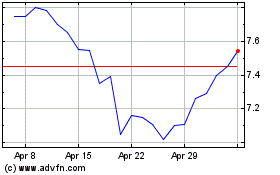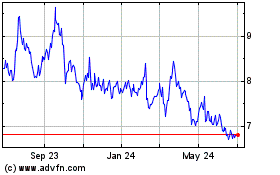By John D. Stoll
This article is being republished as part of our daily
reproduction of WSJ.com articles that also appeared in the U.S.
print edition of The Wall Street Journal (November 20, 2018).
If you've wanted to catch up with Carlos Ghosn over the past two
decades, your best bet was aboard a plane.
Born in Brazil to Lebanese parents, the 64-year-old car
executive built a legacy combining two companies based 10,000 miles
apart. Last year, he told me that he schedules his appointments one
year in advance.
"I have four places where I work," he said during an interview
in New York, for which he came on a tight timetable and armed with
an entourage of staffers. He ticked off Amsterdam, Paris and two
offices in Tokyo. That was "on top of going from time to time into
the operations just to make sure that we don't lose contact with
reality."
The hurried life came to an abrupt halt on Monday when he was
arrested in Tokyo on financial charges. Nissan Motor Co., the auto
maker he salvaged in the late 1990s, intends to oust him after
uncovering significant misconduct. Nissan is tied to Renault SA in
an alliance Mr. Ghosn formed and long led.
Car executives once upon a time played the role that Silicon
Valley founders like Facebook's Mark Zuckerberg or Amazon's Jeff
Bezos play today. Icons like Lee Iacocca, Henry "The Deuce" Ford II
and Fiat's Gianni Agnelli were watched, with highflying lives,
brash managerial styles and colorful comments closely
documented.
Mr. Ghosn is a throwback to those days, often treated as a
superstar in the Japanese media for his exploits. He was depicted
as a comic book hero and more recently had his biography published
in portions by prominent newspapers. In 2006, a colleague and I
wrote a Wall Street Journal profile characterizing him as "The
Hottest Car Guy on Earth."
During a dinner interview in his hotel suite back then, Mr.
Ghosn washed down filet mignon with a Bordeaux before quickly
launching into a clear and comprehensive answer to a question.
"These bigger-than-life personalities are necessary to achieve
exceptional things, but they come with enormous downsides," Bob
Lutz, a longtime auto executive who served as General Motors Co.'s
vice chairman, told me Monday. The cigar-chomping Mr. Lutz was also
no stranger to the spotlight.
Mr. Ghosn's abrupt fall has consequences for the global car
business beyond the companies he ran. He was among the last
globalists standing in an industry whose captains increasingly see
as too fragmented and regional to consolidate.
Like-minded counterparts have been falling by the roadside for
years. Martin Winterkorn, one of the architects of the multi-headed
behemoth that is Volkswagen AG, was taken down in a 2015
emissions-cheating scandal; Sergio Marchionne, the chain-smoking
executive who married Fiat SPA and Chrysler, died in July; Daimler
AG Chief Executive Dieter Zetsche -- who struck an alliance with
Mr. Ghosn -- will step down in six months.
Messrs. Ghosn and Marchionne both saw a need for increased scale
in an auto business that is brutally cyclical and takes piles of
cash. Under this theory, alliances join to share costs of battery
development or artificial-intelligence research.
But mergers have now been largely discounted in the auto
industry, with critics pointing to the failed tie-up of Chrysler
and Daimler in the early part of this century as an example of a
marriage gone wrong.
It's been a long time since Mr. Ghosn struck out in his grandest
quest. A dozen years ago, he tried to add General Motors Co. to the
Nissan-Renault alliance but was rebuffed by executives running a
U.S. auto company that was still No. 1 in sales even as it tried to
shrink its way to profitability.
"My question was how do you keep this straight?" Mr. Lutz said,
referring to his discussions back then with Mr. Ghosn.
"Sure, within a region like North America, an alliance could
work because when you consolidate and close operations near each
other, you can get huge efficiencies. But across the Atlantic?
Hell, you can't consolidate purchasing and legal and accounting at
that level."
Others, from Toyota Motor Corp.'s Akio Toyoda to Ford Motor
Co.'s Bill Ford, have also adopted the defensive posture,
particularly as the auto industry's future looks increasingly
uncertain. "There is something to be said about smaller, leaner and
uncomplicated ventures," Mr. Lutz said.
When GM CEO Mary Barra rejected Mr. Marchionne's more recent
merger attempts earlier in the decade, she pointed to a need to
make bets that were smarter but not necessarily bigger. Ms. Barra
is a poster child for modern automotive leadership, pulling out of
major markets, including Europe, to fund big technology initiatives
needed to fend of Alphabet Inc., Uber Technologies or Tesla Inc. in
the race to make self-driving electric cars.
Mr. Ghosn, meanwhile, hadn't abandoned his expansive visions,
recently acquiring scandal-plagued Mitsubishi Motors in a bid to
become the top-selling car maker in the world. He aimed to sell as
many as 14 million vehicles annually in fairly quick order, or
one-third more than the current No. 1 Volkswagen currently
sells.
He also sought to build a bridge between yesterday's auto
industry and whatever happens next. While most of Nissan-Renault's
vehicles rely on 120-year-old technology (combustion engines and
steering wheels), Mr. Ghosn was an evangelist for automated driving
and battery power. Nissan's Leaf was among the industry's first
electric cars and it remains a best seller.
Nissan and Renault may endure, but any drive to globalize the
auto industry will be significantly set back if those two companies
separate in the wake of Mr. Ghosn's new troubles.
"Globalization is facing challenges because people have
forgotten the advantages it has brought," he said shortly after
Donald Trump was elected president on an "America First" platform.
The problem, Mr. Ghosn said, wasn't enough people were talking
about potential benefits.
From where he sits now, there's little Mr. Ghosn can do to
revive that conversation.
Write to John D. Stoll at john.stoll@wsj.com
(END) Dow Jones Newswires
November 20, 2018 02:47 ET (07:47 GMT)
Copyright (c) 2018 Dow Jones & Company, Inc.
Nissan Motor (PK) (USOTC:NSANY)
Historical Stock Chart
From Oct 2024 to Nov 2024

Nissan Motor (PK) (USOTC:NSANY)
Historical Stock Chart
From Nov 2023 to Nov 2024
